 |
| Focus:
Japan’s Domestic Economy |
JETRO,
1221 Avenue of the Americas, NYC, NY 10020 September
9,
2005 September
9,
2005
|
Japan Enters New Phase of Its Economy Recovery
|
Encouraged
by positive reports, foreign observers are becoming far more
positive about Japan’s economic prospects. The latest
data, includes noteworthy improvements in employment, land
prices, consumer and industrial confidence as well as spending,
indicating that Japan’s economy is gaining speed and
may be entering a new phase of sustained recovery. Regulatory
changes have played an important part in laying a foundation
for these developments as well.
A move by Prime Minister Koizumi to call for new elections on September
11th in the face of resistance to his efforts to privatize Japan’s
$3 trillion Postal Savings System (PSS) has led some analysts to
suggest that heightened political uncertainty will undermine further
economic progress. Investors, however, have been accelerating their
allocation of funds into Japan-related investments. Many believe
this is because the Prime Minister’s actions have served to
focus a spotlight on those who have been resisting reform. They suggest
that regardless of the outcome on September 11th, the entry of non-traditional
pro-reform candidates into the political arena, is likely to have
major consequences -- not only in terms of economic reform – but
also in respect to political, social and cultural practices
There are certainly risks to investing in Japan, and improvement
is not likely to be linear in nature. Nevertheless, improving fundamentals,
favorable valuations, and ongoing corporate rationalization suggests
both portfolio and corporate investors would be wise to pay more
attention to Japanese business and financial markets.
The Japan External Trade Organization (JETRO) provides the
following information, which examines these issues and other
relevant developments
in greater detail.
|
Japan
Making Significant Progress in Initiating Sustainable Domestic Recovery
|
|
The Japanese
economy continued to yield positive economic news on multiple fronts
during the second quarter of calendar year 2005. Bankruptcies decreased
9 % year-on-year and unemployment fell as well. Japanese companies
also sustained their efforts to upgrade plant and equipment, boosting
investment spending by 2.2 % over the April-June quarter.
Although Japan’s real GDP rose only by a modest 0.3 % in the April-June
quarter (a 1.1 % annual rate), a look at the broader numbers led BNP Paribas
economist Yoshimasa Maruyama to state, “… the numbers are very strong.
The headline may not look that good, but the reality is far more positive.” Supporting
this assessment, government statistics reported that Japanese economic output
rose a seasonally adjusted 1.5 % in June. Electronic components represented an
important component of this increase and suggest, in the view of Credit Suisse
First Boston (CSFB), that Japan’s IT sector was making progress in reducing
its inventories. Machinery orders were also a standout, surging by 11 % in June
from a month earlier.
June’s Tankan survey also showed a significant rise in business confidence.
Commenting on the survey, CSFB economist Yukari Sato opined in a Financial Times
article that the survey results were “an economic turning point for Japan.” There
was more behind this optimism, however, than the Tankan survey. Japanese exports
in June, for example, rose for the first time in three months, reaching a record
high of $48 billion.
This news was complemented by a rise in Japanese employment and retail sales
figures, which are now at their highest levels since 1997-1998. As a result,
Jesper Koll, chief economist at Merrill Lynch Japan asserted in the aforementioned
Financial Times article that, “the conditions for a self-sustaining domestic
demand-led non-inflationary growth path are better than ever. It’s never
been as good as this.”
On the employment front, Japan’s jobless rate fell by almost 300,000, to
its lowest level in seven years.
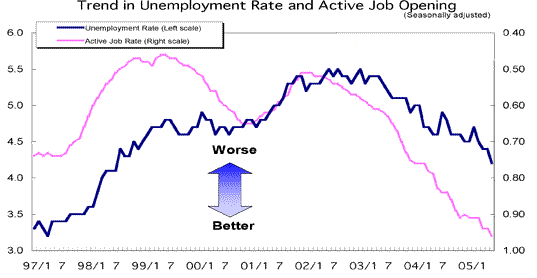
Source: Government of Japan, Labor Force Survey, etc.
Other statistics hint that Japan’s improving labor situation is fueling
growth and a rise in full-time positions as well as wage increases. Data shows
average earnings in June increasing 1.1 % over the previous year. Positive trends
in land prices in certain areas of Japan, also indicate a trend toward greater
confidence on the part of Japanese consumers. Equally important, there are also
signs that Japanese citizens are beginning to draw money from their bank accounts
to invest in the stock market. This suggests Japanese households are becoming
less risk adverse.
Domestic consumption, which many view as the “missing link” to a
sustainable recovery in Japan, also appears to be on more certain footing. Progress,
however, has not been linear. For example, after a 2.7 % year-on-year rise in
May -- following even stronger April results, private consumption consolidated
to a more modest year-on-year rise of 0.1 % in June. Nevertheless, Takuji Aida,
an economist at Barclays Capital, took the position that “Japanese domestic
demand is much stronger than the markets expects.”
Another factor troubling Japan in recent years is the phenomenon of deflation.
Deflation limits domestic spending as it reinforces a reluctance to consume.
While signs of deflation continue to exist in Japan, current data shows it
has begun to ease or even reverse itself in certain areas. Barclay’s Capital,
for instance, argued that data showing a rise in clothing prices “where
deflationary pressure had previously been strongest, is symbolic of the easing
deflation in the Japanese economy.” Other commentators have pointed to
the decline of 100 Yen stores as evidence of the moderation of deflation. Indeed,
in the business sector, prices are actually increasing.
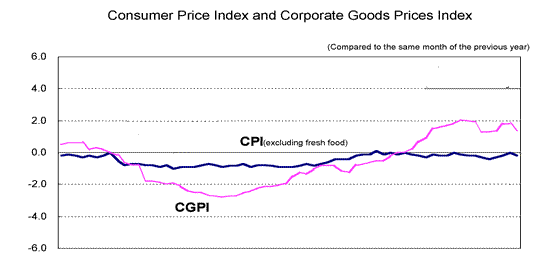
Source: Government of Japan.
|
| |
Japanese
Government Accentuates Commitment to Restructuring & Reform
|
| |
Another factor
that bodes well for Japan is continuing efforts by its government to
create a positive environment for restructuring, reform, and foreign
investment. Measures initiated since the adoption of the Action Plan
for Economic and Structural Reform almost ten years ago include tax
reforms, changes to the Anti-Monopoly Act, and the development of new
policies vis-à-vis hostile takeovers. Japan’s nascent
policies with respect to takeovers are summarized in the following
chart:
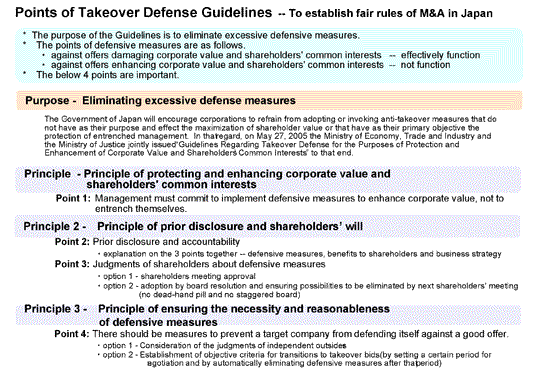
Source: Japanese Ministry of Economy, Trade and Industry
These steps have been well received by foreign governments, industry
associations and investors and are reflective of Japan’s continuing desire to encourage
increases in foreign investment through mergers, joint ventures, and even hostile
takeovers – a practice considered virtually impossible in Japan even a
year ago. Initiatives to support FDI are also likely to derive additional energy
in the future as Japanese and foreign shareholders are increasingly willing,
and empowered, to exert their influence on management to gain maximum efficiencies
and value.
|
Corporations Now Moving to Enhance Efficiencies and Shareholder Value
|
| |
The corporate sector in Japan has not been idle in the face of numerous
government-led policy and reform initiatives. Changes in competition
and tax laws, coupled with market pressures, have induced consolidation
in the steel, paper/pulp, and distribution sectors. Furthermore,
Japanese firms have begun to unwind cross-shareholdings. As the
Japanese corporate model has changed, firms have become more willing
and eager to embrace foreign investment.
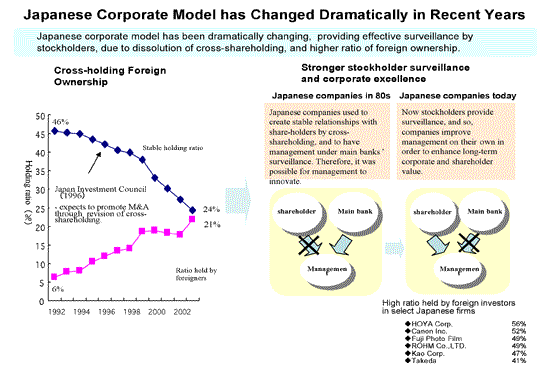
Source: Japanese Ministry of Economy, Trade and Industry
These changes have led to a surge in M & A activity. Japanese firms
are now utilizing M&A techniques to restructure and enhance the competitiveness
of their operations. At the same time, M&A activity between Japanese
and foreign firms has also risen significantly since the early 1990s,
when it was virtually nonexistent -- yet still accounts for only a relatively
small amount of total activity. As foreign entities increase their commitment
to Japan, and Japanese managers and employees become increasingly comfortable
operating under foreign ownership, cross border M&A is likely to
represent a progressively larger share of total activity.
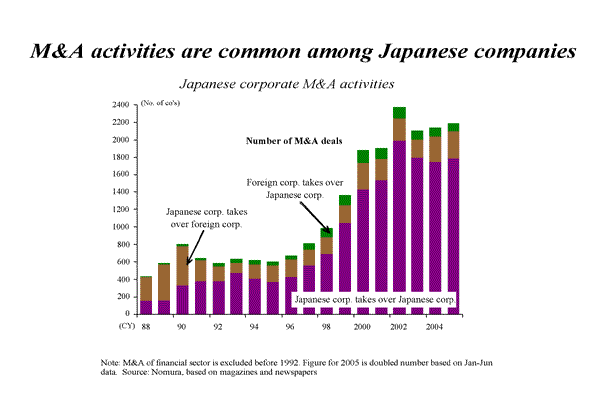
Individual Japanese firms are also introducing other measures to
achieve efficiencies and to control costs. Sanyo, for example,
a major electronics
firm, recently announced plans to initiate a comprehensive restructuring,
involving a 15% workforce reduction. Sanyo’s new CEO, Tomoyo Nonaka,
the first woman ever to head a leading Japanese electronics group, noted
in a Financial Times article titled “Sanyo wields axe to achieve
turnaround” that “there will be no taboos” in the restructuring
program. For its part, Sony appointed a foreigner, Howard Stringer, as
Chief Executive, in an effort to restore the firm’s role as an
innovative global powerhouse. Restructurings and consolidations are a
hard reality of business, even where so-called “new economy companies” are
concerned. For instance, in the game software sector, Sega has merged
with Sammy, Bandai with Namco, and Takara with Tomy.
Japanese businesses continue to invest, to enhance their competitiveness
and to prepare them for new opportunities. During the first quarter
of 2005, Japanese manufacturers increased their investment by approximately
8 % while other Japanese firms boosted their investment by roughly
7
%. According to GaveKal Research, what may be most noteworthy about
this data is that Japanese firms are investing to “churn out profits;” that
is, “without lowering the returns on invested capital.”
Higher levels of corporate investment are attributable, to a large
extent, to the double-digit increases in profitability experienced
across both the manufacturing
and non-manufacturing industries. This is particularly true among SMEs. Indeed,
Japanese manufacturing SMEs recorded a dramatic 42 % increase in profits
in the first quarter of 2005 -- compared to the first quarter of
2004.
A third area where there are positive developments are actions taken
by Japanese managers to focus on shareholder value. This is manifest
in the rising number
of dividend payout increases and share buybacks announced in recent years.
Japanese companies are also according more importance to communicating with
outside investors,
sometimes hiring investor relations firms to connect with shareholders.
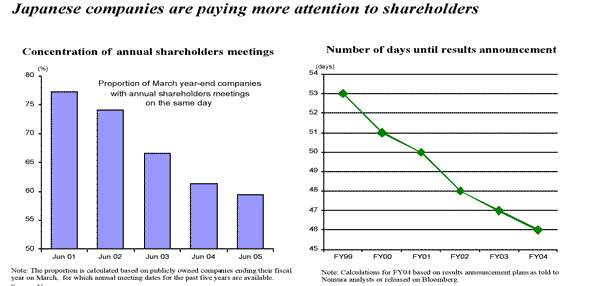
Source: Nomura Securities
Many analysts believe Japan’s changing corporate environment, coupled with
supportive policy moves, is opening up a range of new opportunities. U.K.-based
Hermes, for example, has partnered with Nissay Asset Management of Japan (Namco)
to create one of many new funds seeking to foster change on under-performing
companies. Wataru Tanaka, the president of Namco, told the Financial Times “the
time is right to introduce a new investment philosophy based on encouraging shareholder
friendly management.”
Aside from market forces, already-enacted government policies as well as
policies now being developed, will serve to sustain and enhance the transformations
now taking hold. More specifically, changes in disclosure requirements,
accounting standards, and the tax code will continue to generate incentives
for Japanese
firms to pursue efficiencies, to embrace domestic and foreign partners,
and to
invest at home and abroad.
|
Investors
Significantly Increasing their Involvement in the Japanese Economy
|
| |
| |
Japanese
stock market indexes hit four year highs in late August, with both
the Nikkei-225 and Topix reaching levels not seen since April 2001.
This strength had much to due with inflows of foreign funds, which
had been positive for five consecutive weeks, and totaled nearly
$450 million in the week ending August 17 alone. The strengthening
case for investing in Japan is linked to numerous factors, including
improvements in consumer demand and corporate spending, corporate
profitability, and a newfound emphasis on stockholders, and supportive
government policies. In addition, rising confidence in, and coverage
of, Japanese economic trends, is helping to attract a wider group
of investors, who are now coming to recognize the potential for diversification
and the fact that many Japanese firms possess more favorable stock
market valuations than their competitors in European and U.S. markets.
Despite the surge into Japanese equities that has been seen, Hideki Takayama,
chief investment officer at State Street Global Advisors, stated in remarks
to the Wall Street Journal, “It is not too late” to invest.
For his part, Youssef Affany, head of investment counseling at Citigroup
Private Bank observed, “Japan is about to realize its longer-term
growth possibilities”. Technically-oriented investors also saw
positive signs in the surge of Japanese indexes through resistance levels.
As reported in Barron’s, even Japan bears seem to be embracing
the view that the country has reached a turning point with Dr. Carl Weinberg
of High Frequency Economics, a long-time pessimist, expressing hope about
Japan’s economic prospects.
Corporate and other direct investors also seem to be more optimistic
about the prospects of Japan and Japanese corporations. According to
government data released in June, foreign direct investment over the
twelve-month fiscal year ending last March was approximately $36 billion,
double the previous twelve-month period. Incoming FDI was substantial
enough to outweigh outgoing FDI for the first time since Japan started
keeping records in 1950.
|
Japanese
Fundamentals Likely to Improve Despite Any Present Uncertainty
|
| |
While fund
managers such as Hans Goetti, of Citigroup Private Bank in Singapore,
maintains a thoroughly optimistic outlook, stating in a recent
Bloomberg interview that “Japan’s story is one of the
most compelling you can find globally”, it should be noted
that all investments are not without risk and uncertainty. For
one thing, the rush by many financial investors to redress their
underweight allocation of funds to Japan may lead to some consolidation
in coming months. This should not be surprising given the Nikkei
225 index rose over 5% in the first 12 trading days since lower
house elections were called on August 9th. Another potentially
salient risk is the impact of increasing oil prices as well as
the potential for economic weakness in China, Europe or the United
States. Despite increasing signs of domestic strength, these markets
absorb large quantities of Japanese exports. Therefore, weakness
in these markets could have major implications in terms of economic
activity in Japan.
On the bright side, Asian integration and Japan’s increasing ties
with India and Southeast Asia, both detailed in the last JETRO
Focus,
will make it somewhat less vulnerable to the vagaries of the American and
European economies. On the other hand, should U.S. economic growth remain
stable, this is likely to create additional opportunities and remove, in
the words of Richard Jerram, economist at Macquarie Research, “one
risk that could disrupt the domestic recovery” in Japan.
While analysts and investors need to incorporate risk and volatility into
their investment plans, they also need to be cognizant of the continuing
improvement in Japan’s underlying fundamentals. Rising output growth,
consumer spending, increasing capital investment, as well as major changes
in Japanese corporate strategies are all leading to greater interest and
opportunities for business and investors. Finally, it should be emphasized
that many Japanese companies are now valued at what Goldman Sachs recently
termed “… historical lows”. This allows for substantial
appreciation both within selected Japanese equities as well as fixed investment
into companies, real estate, greenfield projects and many other areas and
sectors.
|
Momentum
Likely to be Sustained Regardless of September Election
|
| |
WOn August 9,
Japanese Prime Minister Koizumi dissolved the lower house of parliament
after the upper house refused to back his plan for the privatization
of Japan’s Postal Savings System (PSS), the largest financial
institution in the world. As detailed in a previous JETRO
Focus,
the PSS controls a third of Japanese household deposits and a major
share of Japan’s life insurance market. It is also a major purchaser
of Japanese government bonds.
Certain commentators have interpreted the dissolution of the Lower
House of Parliament as signaling the end of Prime Minister Koizumi,
the LDP, and the PSS reform agenda. Investors, however, appear to be
unconcerned, and in fact have moved to accelerate their fund allocations
into Japan. Indeed, the Nikkei 225 and Topix finished incrementally
higher the day that Koizumi called snap elections and ended the week
with its largest weekly advance in more than 18 months. Paralleling
this, the Japanese yen, which initially fell after the defeat of the
PSS reform bill, ended unchanged and rose to its highest level since
July 21. Standard & Poor’s, the credit rating agency, affirmed
its sovereign ratings for Japan.
In fact, some analysts have noted the primary implication of the Prime
Minister’s actions has been to focus a spotlight on those legislators
who have been opposing reform. As a result, many stories are now being
written about the 37 pro-reform “assassins” who are now
campaigning with the support of the Prime Minister. One candidate recently
commented in the Mainichi Daily News on the role of these new players
stating, "I think they're trying to stimulate the world of politics
by bringing in more people with different backgrounds". As a result,
it can be imagined the entry of more women and other non-traditional
candidates into the political arena, is likely to have major consequences
regardless of the outcome on September 11th – not only in terms
of economic reform – but also in respect to political, social
and cultural practices. It would be fair to say this is likely to further
open up Japan to foreign involvement and lead to many exciting new
business and investment opportunities.
Perhaps, the most important factor behind rising investor optimism,
is the belief that Japan has already reached the level of momentum
needed to sustain its economic recovery efforts. For example, the movement
to clean up Japan’s financial system is eliminating overcapacity
and debt. This is one of many factors leading to powerful political,
market, and attitudinal shifts that are likely to sustain Japan’s
economic transformation and recovery regardless of any short-term political
uncertainty. This can be seen in comments by Jan Lambregts, head of
Asia-Pacific research for Rabobank, who told the Financial Times, “medium-to-long
term, the positive backdrop for Japan is mostly an improving economic
story and one we don’t think the same or different political
leadership could easily mess up,” Tetsufumi Yamakawa, co-director
of Asian economic research at Goldman Sachs echoed these sentiments
in the same article stating that, “reversal to the ongoing structural
reform policies laid down by Koizumi so far, is difficult to imagine.”
|
|
|
| |
|
| |
| |
Data,
statistics and the reference materials presented within this newsletter
have been compiled by JETRO from
publicly-released media and research accounts. Although
these statements are believed to be reliable, JETRO does not guarantee
their accuracy, and any such information should be checked independently
by the reader before they are used to make any business or investment
decision.
|
| |
|
| |
For additional information on economic
and financial trends in Japan, please contact Akihiro Tada, Executive
Director of JETRO NY at Tel: 212-997-0416, Fax: 212-997-0464, E-mail:
Akihiro_Tada@jetro.go.jp
|
Focus:
Asian Economic Integration
Focus:
Structural Reform
Focus:
Economic Recovery
Focus:
Privatization
Focus:
Economic Recovery
Focus:
Entrepreneurship
Focus:
Consumer Demand
Focus:
Asia
Focus:
Gross National Cool
Focus:
Regional Development
Focus:
New Policy Challenges
Focus:
Investment Japan IV
Focus:
Investment Japan III
Focus:
Biotechnology
Focus:
Investment
Japan II
Focus:
Investment Japan
Focus:
Foreign Direct Investment
Focus:
Mergers & Acquisitions
Focus:
Entrepeneurship
Focus:
Economic Revitalization
Focus:
Industrial Revitalization
Focus:
Foreign Investment
Focus:
Bush Visit
Focus:
Koizumi Visit
Focus:
Economic Rebirth
Focus:
Hiranuma Plan
Focus:
Foreign Direct Investment
Focus:
Emergency Economic Package
Focus: Action Plan
Focus:
Economic Reform
Focus:
Okinawa Summit
Focus:
Small Business Development
Focus: New Enterprise Development
Focus:
Industrial Revitalization
Focus: Economic Recovery 4
Focus: Steel
Focus: Economic Recovery 3
Focus:
Economic Recovery 2
Focus: Economic Recovery
|
|
Focus is published and
disseminated by JETRO New York in coordination with KWR
International, Inc. JETRO New York is registered as an agent of the Japan External Trade
Organization, Tokyo, Japan and
KWR
International, Inc. is registered on behalf of JETRO New York. This material is filed with the Department of Justice
where the required registration statement is available for public viewing.
|





